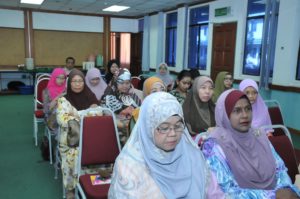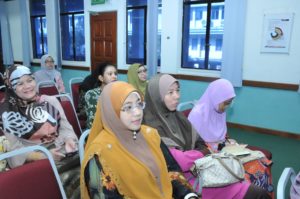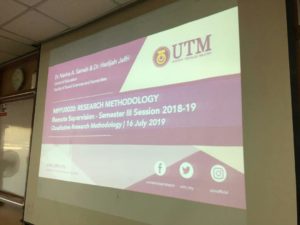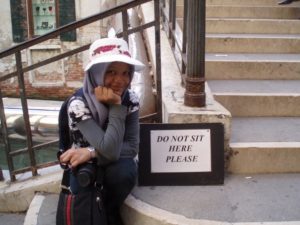I attended the talk about Future Ready Educators (FREE) by the Director of Curriculum Development and Innovation Unit (CIDU) at D05 yesterday (8 July 2019, Monday).
So, what is Future Ready Educators actually? Simplified version (i.e. my version): It is educators who are equipped with knowledge and skills (whatever necessary) in teaching future generations including the millennials by using technology in their teaching and learning process. Well, everybody must think that “I use powerpoint i.e. technology, so I am already future ready educator“. Err, it is more than using such tools in our class. It is about how we engage students in the learning process with the use of technology.
So, for example, rather than lecturing various theories of motivation, what I did last semester was, I gave each student a copy of material which contains information about theories of motivation. Then later on, I divided them into several groups. Within one group, there would be five members/students. I gave them a written instruction that they can refer to if they do not understand what they should in their discussion. Ok, now, where is the technology that I had used here? Wait. Please continue reading.
It looks like a normal discussion. Well, it is not because I used “jig saw technique”. I gave them specific instruction to follow.
Cooperative learning [Jigsaw activity]
Instructions:
- [Individual task. 10 minutes]: Each member has been assigned with a sub-topic. Each member has to read on his/her own for 10 minutes of the given sub-topic from a textbook.
- While reading the given sub-topic, write down anything that is confusing that you want to ask to other expert in your expert group.
- Write your own notes to summarise your understanding from your reading.
- [Expert group. 25 minutes]: After 15 minutes, those who are assigned with the same sub-topic (for example, behavioural theory Group 1-11 should gather together and discuss the sub-topic based on their individual reading. Since we have 11 groups, so there will be two groups for each topic. Meaning, representative of each topic from Group 1 to 5 will be in Group A and representative of Group 6 to 11 will be in Group B).
- Take turns to explain what you understand based on your reading (3 minutes per person).
- Take turns to record important points presented by each member.
- Ask any question that you might have or anything that need to be clarified based on your individual reading in this group.
- Please help each other to understand by clarifying or giving examples.
- You should spend 25 minutes on expert discussion [3 minutes x 5 or 6 students = 15 or 18 minutes. Additional 7 minutes for recording/refining your notes].
- [Original group. 30 minutes]: After 25 minutes of discussion in expert group, each team member with different sub-topics gather as a group [refer to your group assigned to you].
- Take turns to present each sub-topic to your group member (5 minutes x 5 sub-topics = 25 minutes).
- Ask any question that you might have or anything that need to be clarified during discussion.
- Please help each other to understand by clarifying or giving examples.
- Take turns to record important points presented by each member.
- Recorder(s) and leader should record important points presented by each member.
- You should spend 30 minutes on this session [5 minutes x 5 students = 25 minutes. Additional 5 minutes for recording/refining your notes]
- [Individual task. Short quiz of 10 questions using Quizziz. 15 minutes]: Answer all questions.
So, where is the technology here? After I ended the discussion, to make sure that they understand from peer discussion i.e. jig saw activity, I gave them an online quiz. Based on the online quiz, I would know if some of them are still struggling to understand certain things. Previously, I could just ask them orally about what they have understood or give them paper-and-pencil test. But, to allow them to digest information that they have learned, I gave them ample time to revise on their own before answering my quiz. When I looked at the quiz a few days later on, I noticed that majority of them could answer the quiz well. Meaning, out of 15 questions, majority could get 12 or 13/15. Not bad. So, when I met them on the following week, I just quickly rectified some misconceptions (based on their answers, I assumed that it is due to misconceptions). There you go.
Some of you might say, why did I provide the material for the jig saw activity rather than asking the students to find on their own? Well, in this case, I want to make sure that everybody will use the same material. If I ask them to find the materials themselves, they might find different materials. Well, isn’t it better in that sense, right? Well, not necessarily. It depends. In my case, I notice that NONE of my students had a textbook. So, the material that I provided is from a textbook. My stance is, at least, they read extensively one whole chapter based on the material that I provided (i.e. I photostated ONE whole chapter for them). 😀
Here is an example of cooperative learning i.e. jig saw activity which I added with an online quiz (technology). Am I a future ready educator? Well, I can’t claim myself as such if I only use active learning in my class, right? I need to diversify my teaching techniques and activities that I give to my students. I have a long way to go.


Note: En Fuad Ahmad took some pictures. I looked so intense in this picture. Don’t ask me what I scribbled in my small notebook. It is not something important. 😀





